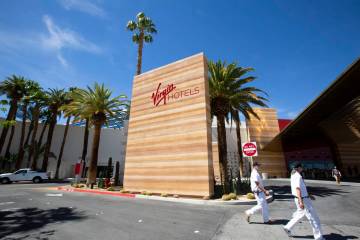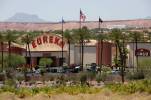Indian casinos target Las Vegas-style features
Casinos on American Indian reservations have blossomed into a $26 billion-a-year industry scattered across the nation. And, as they've grown in number and revenue, they've also added resort-level amenities.
Although tribal gaming has matured since the mid-1970s, when tribes in Florida and California first introduced bingo halls, the industry remains positioned as regional entertainment, competing among themselves rather than challenging Las Vegas as the nation's premier gaming destination.
That's not to say some in the industry aren't thinking big and adopting Las Vegas-quality trappings to lure business away from other regional venues.
"There is growing competition between tribal casinos," said Mark Birtha, president and chief development officer of Sol Casinos in Tucson, Ariz. "My goal is to create a property ... that has all the bells and whistles of a Las Vegas resort. We are boutique properties that are more intimate."
In February 2010, the Pascua Yaqui Tribe broke ground on a $130 million expansion of the Casino del Sol near Tucson. The 17-month project completed this month features a 215-room hotel and more than 65,000 square feet of meeting and convention space.
The pool has a beachfront entrance and VIP cabanas. Indoors, there's an upscale steakhouse, a spa and two Starbucks coffee shops. The resort employs a master mixologist and a sommelier, positions seen only recently at tribal casino-resorts. A golf course and more retail space are planned in 2012.
"What we brought to Casino del Sol with this expansion was a level of sophistication and design not seen in this market before," said Birtha, who joined Sol Casinos in March 2010 after 15 years with Las Vegas Sands Corp. and Marriott International.
He described the expansion as a "four-star operation" with the attention to detail that you would find a Wynn or The Venetian in Las Vegas.
CONTINUING TO GROW
According to the most recent figures available through Casino City's Indian Gaming Industry Report, 237 tribes -- or 42 percent of all federally recognized tribes -- had some kind of gaming operation in 2009.
While some tribes had operations early on, it wasn't until 1988, when Congress passed and President Ronald Reagan signed the Indian Gaming Regulatory Act, that tribal gaming revenues started to skyrocket,
growing from $100 million per year to $16.7 billion 2006. The past five years have seen even more expansion, with annual gaming revenues now topping $26 billion. By comparison, all non-Indian gaming in Nevada generated $10.4 billion in revenues in 2010, according to the state Gaming Control Board. Total consumer spending on non-tribal casinos in 2010 was $34.6 billion.
That steady revenue has helped many tribes long plagued limited economic prospects and high reservation poverty to fund health clinics, schools, housing and other services.
While most tribes are financially successful, some are looking beyond casinos to build more inclusive resorts that can compete regionally. They're also building more amenities that yield higher returns to build an economic base.
Now the tribes are upgrading, transforming their properties into lavish, full-service casino-resorts that offer everything from branded restaurants and upscale shops to luxurious hotels and signature golf courses.
"What is going on with tribal casinos is just a natural evolution," said Victor Rocha, owner of Pechanga.net and member of the Pechanga Band of Luiseno Indians in Riverside County, Calif. "Tribal casinos began in trailers and tents, before we built stand-alone buildings. These resorts are just a natural evolution of the product."
LEARNING FROM LAS VEGAS
While tribal gaming has seen healthy growth over decades, it hasn't been recession-free.
Tribal gaming nationwide generated $26.4 billion in revenues in 2009, a
1 percent decline from the $26.7 billion in 2008, according to the 2009-2010 Indian Gaming Industry Report by Nathan Associates Inc. in Irvine, Calif.
The decline was slight considering the 8 percent decline in the commercial casino segment of the gaming industry, but continues a slowdown in tribal gaming over the past several years.
"We've learned a lot from Las Vegas, especially what not to do, which was not to overbuild," Rocha said. "To be honest, some tribes overbuilt, but most built to suit their demand."
Rocha said some in the tribal gaming industry are still working to repay billions spent in better times to build resorts. Two of those casinos, he said, are the Mohegan Tribe's Mohegan Sun and the Mashantucket Pequot Tribe's Foxwoods, both in Connecticut.
The Mohegan Tribal Gaming Authority, which owns the Mohegan Sun, has $800 million in debt coming
due in the spring of 2012, financial reports show. The authority also has $250 million in debt coming due in 2013.
"The recession was one of the best things to happen to tribal gaming," Rocha said. "It forced them to think about their properties and how they were spending their resources."
Now, with construction costs as much as 15 percent lower than in recent years, forward-looking casino owners are expanding and renovating.
Besides lower construction costs, several other factors contribute to the expansion of tribal properties. Those reasons range from slight increases in consumer spending on gaming, improvement in the lodging and travel business and a finance community becoming more receptive to deals.
One of those projects was a new entertainment center expected to open adjacent to the Harrah's Ak-Chin Casino Resort on Ak-Chin Indian Community land, south of Phoenix. Construction began last month on the 162,000-square-foot entertainment complex that will feature a 12-screen movie theater, 24-lane bowling alley, arcade, laser tag, restaurants and an amphitheater.
The project will also have 22,000 square feet of retail space. The expansion cost has not been disclosed.
A recent study by ESI Corp. found the Ak-Chin casino accounted for nearly 1,100 jobs, or about $36.7 million in annual payroll. It also generated more than $205.3 million in economic activity for Pinal County last year.
Some projects are as small as adding a new restaurant. The Pokagan Band of Potawatomi Indians will add a 12,000-square-foot Hard Rock Cafe as part of an expansion of its Four Winds Casino in Michigan.
Even small upgrades can have a big impact.
KNOWING YOUR MARKET
Sol Casinos' Birtha said the addition of 215 hotel rooms and 65,000 square feet of convention space has had an immediate impact.
"We already have an excess of
$1.5 million in booking from across the country," he said. "We have meetings already booked for 2012 and into 2013, which is something we are very pleased with."
While increasing amenities and quality, the resort isn't aiming to divert trade from Las Vegas, Birtha said. He described Casino Del Sol as a "boutique property" that competes locally and regionally for business.
"Las Vegas is the brand-named market in the hospitality and gaming business," Birtha said. "We expanded to better compete in the regional and local marketplace."
To compete in a local or regional market it's about knowing your customers and what they want, not building 3,000-room hotels and 100,000-square-foot casinos.
"Absolutely, there is competition between tribal casinos," Birtha said. "But we are also in competition with large local resorts."
In the greater Tucson area, the Casino del Sol faces tough competition from upscale resorts including the Westin La Paloma Resort and Lowes Ventana Canyon, as well as brand-name hotels such as Hilton and J.W. Marriott.
Birtha said he wasn't competing with Las Vegas for convention business, but he wouldn't complain if the University of Arizona, Raytheon Co. or another large Tucson company choose Casino del Sol over Las Vegas.
"We have a very stable market," he said. "We have a stable base of customers. Mexico is huge for us. Plus our cash flow is much more stable because we didn't get ahead of ourselves."
Birtha said tribal gaming was a "unique" industry to work in, but it's a growing industry.
Contact reporter Chris Sieroty at
csieroty@reviewjournal.com or 702-477-3893.






























